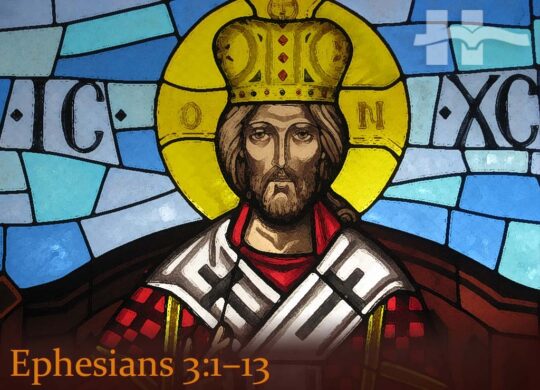Ephesians 3:1–11

Paul’s divinely empowered role in the administration of God’s plan forms a paradigm for the ministry of all believers, as God is made known to the cosmos through the church.
Paul begins in Ephesians 3:1 intending to utter an intercessory prayer but breaks off immediately, to resume in 3:14, where he repeats his opening phrase, “For this reason ….” The seeming digression of 3:2–13 describes the stewardship entrusted to Paul by God’s grace—the apostle’s ministry to the Gentiles and its relationship to the “mystery of Christ” (3:4)—and it becomes a paradigm of how believers’ individual and corporate ministries are integral to this glorious plan of God.
Paul labels himself “the prisoner of Christ Jesus” (3:1). That’s true, but he is also the prisoner of Caesar, who in earlier chapters of Ephesians was extolling the triumph of the God he serves, the God who has exalted Christ as cosmic lord and is consummating all things in him. How can the ambassador of such a great God be a humble captive in the dungeons of a pagan emperor? Indeed, Paul’s captivity reflected the daily experience of God’s people—outnumbered, insignificant, weak, and suffering. If these saints were co-citizens being co-fitted and co-built into the dwelling of the glorious God (2:19–22), should not this privileged position of Christians be reflected in actuality now?
In 3:2 (and in 3:9), Paul sees himself playing a definitive role as a preacher to the Gentiles, a steward in God’s grand plan. “The consummation of all things in Christ” (1:10), God’s cosmic plan to bring all things to completion and in alignment to his will in the fullness of time, had now been “revealed” to God’s apostles and prophets by the Holy Spirit (3:5), a company that included Paul himself, to whom the “revelation” was “made known” (3:3). The “mystery” here is specifically about those who were once outside now being introduced into a new sphere of life, into a new “in-Christ” realm (2:11–22; 3:6). Thus, despite his agonizing situation as a prisoner, in the wondrous divine action of consummating all things in Christ, Paul played a major role.
This use of Paul in this divine action was entirely a matter of grace (3:2–3, 7–8). Throughout this pericope, there is a preponderance of passive verbs: “was given” (3:2), “was made known” (3:3), “was not made known” and “has been revealed” (3:5), “was made a minister” and “was given” (3:7), “was given” (3:8), “has been hidden” (3:9), and “might be made known” (3:10). These (divine) passives underscore God as the subject of the divine actions: Paul was engraced by God to be a part of the grand divine program to consummate all things in Christ. And so it is for each individual believer—it is all by grace.
In fact, Paul labels himself “less than the least [literally, “leaster,” a word coined by the apostle] of all the saints” (3:8). This imprisoned, “less-than-the-least”-ranked saint—a prisoner!—is the one who is part of the grand plan of God (3:8). Despite Paul’s “leasterness” (3:8), God’s work is manifest.
And guess what? All God’s people, too, are engraced and empowered for great things, for it is “through the church”—i.e., the unity of this body—that God’s wisdom is manifested (3:10). If Paul, the “leaster” of the saints, could be so used, how much more the rest of the company, who have “boldness and access in confidence” to God (3:12). Therefore, believers are not to “lose heart” (3:13).
[For more details, see my Ephesians commentary.]












 Abe Kuruvilla is the Carl E. Bates Professor of Christian Preaching at The Southern Baptist Theological Seminary (Louisville, KY), and a dermatologist in private practice. His passion is to explore, explain, and exemplify preaching.
Abe Kuruvilla is the Carl E. Bates Professor of Christian Preaching at The Southern Baptist Theological Seminary (Louisville, KY), and a dermatologist in private practice. His passion is to explore, explain, and exemplify preaching.
2 Comments
Hi Dr. Kuruvilla,
I am the Lead Pastor of Trinity EFC in Holdrege NE. I heard that you will soon be releasing another commentary. Any word on when that is coming out and what book(s) it will cover?
Thanks
Thanks for asking, Eric.
Yup, the Pastoral Epistles, 1 & 2 Timothy and Titus, should be out in a month or two.
Blessings,
AK